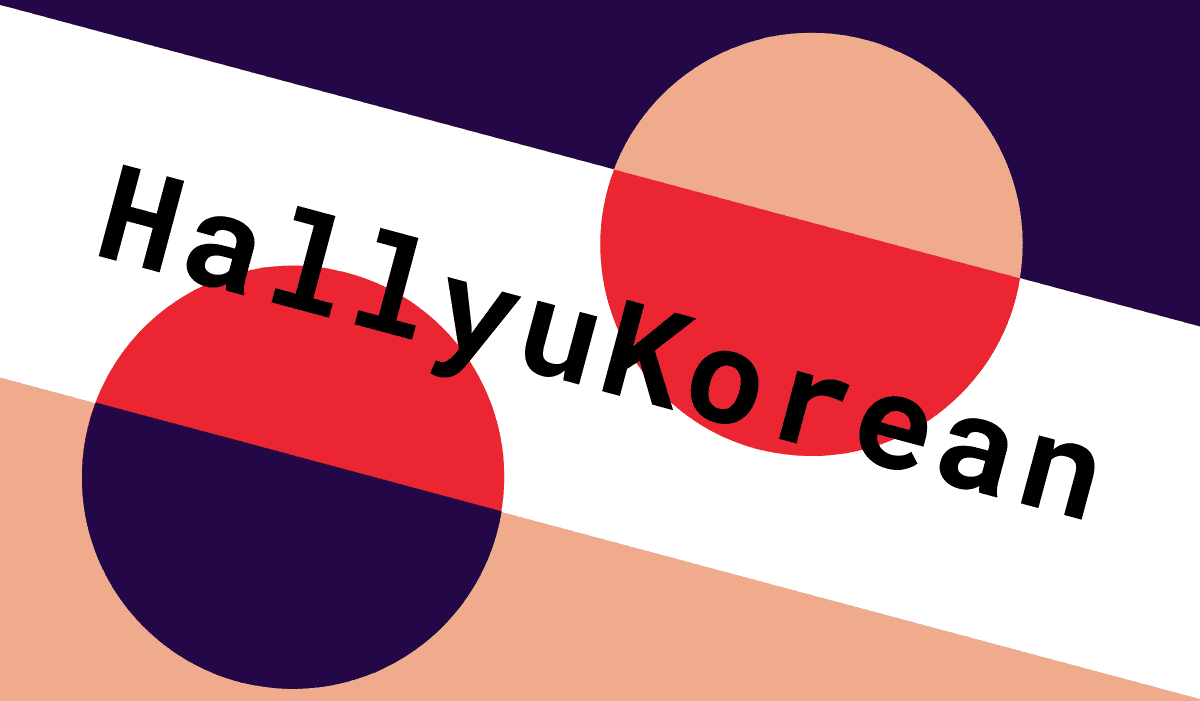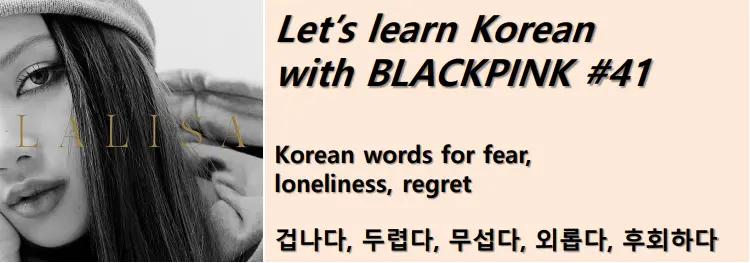Korean words for fear, loneliness, regret : 겁나다, 두렵다, 무섭다, 외롭다, 후회하다
Let’s learn Korean words for fear, loneliness, regret with BLACKPINK lyrics.
Click the play button below to listen to all the BLACKPINK lyrics used in this post.
겁나다 [geop-na-da] to be afraid, to be scary
겁낼 필요도 없잖아
geop-nael pi-ryo-do eop-ja-na
There’s no need to be afraid
*겁낼(겁내다(be scared of) + ㄹ(noun modifier)) +
필요(need) + 도(too) +
없잖아(없다(there isn’t) + ~잖아(as you know))
(~잖아(요) reminds the listener of something or rebukes the listener indirectly.
~잖아(요) is the same as ‘as you know’, ‘didn’t I say that~’ in English.)
두렵다 [du-ryeop-tta] to be afraid, to be scary
세상 무엇도 두렵지 않아
se-sang mu-eot-do du-ryeop-ji a-na
I’m not afraid of anything in the world
*세상(world) +
무엇(what) + 도(too) +
두렵지 않아(두렵다(be afraid) + ~지 않다(don’t))
(*This sentence has no subject.
It’s important to note that while English sentences require a subject, Korean sentences often omit the subject.
The omitted subject can be identified in the context of the dialogue or writing.)
무섭다 [mu-seop-da] to be afraid, to be scary
높은 곳을 무서워하거나 물을 무서워하는 사람들이 있잖아요?
no-peun go-seul mu-seo-wo-ha-geo-na mu-reul mu-seo-wo-ha-neun sa-ram-deu-ri it-ja-na-yo?
Some people are afraid of heights or water, right?
*높은(높다(be high) + 은(noun modifier)) +
곳(place) + 을(object particle) +
무서워하거나(무서워하다(fear) + ~거나(or)) +
물(water) + 을(object particle) +
무서워하는(무서워하다(fear) + 는(noun modifier)) +
사람(people) + 들(plural suffix) + 이(subject particle) +
있잖아요?(있다(be) + ~잖아요?)
(~잖아(요) reminds the listener of something or rebukes the listener indirectly.
~잖아(요) is the same as ‘as you know’, ‘didn’t I say that~’ in English.)
외롭다 [oe-rop-tta] to be lonely
외로웠던 지난날은 너로 인해 no more
oe-ro-wot-deon ji-nan-na-reun neo-ro in-hae no more
My lonely days are no more because of you
*외로웠던(외롭다(be lonely) + 었던(noun modifier for past tense)) +
지난(past) + 날(day) + 은(topic particle) +
너(you) + 로 인해(because of) +
no more
(*Verb stem + ~던 is used to recall a past action or habit that has been repeated often or is still present.
Verb stem + ~았/었던 is used to recall a past event that has not continued into the present
후회하다 [hu-hoe-ha-da] to regret
후회한 들 소용없다 해도 난 널 애타게 생각해
hu-hoe-han deul so-yong-eop-da hae-do nan neol ae-ta-ge saeng-ga-kae
Even when they say there’s no point in regretting, I desperately think of you
*후회한 들(후회(regret) + 하다(do) + ㄴ 들(even if)) +
소용(usefulness) + 없다(don’t exist)
해도(하다(do) + ~도(even if)) +
난(나(I) + 는(topic particle), =난) +
널(너(you) + 를(object particle), =널) +
애타게(desperately) +
생각(thought) + 해(do)
(*Adjective/verb stem + ~은들, ~ㄴ들, ~던들 means ‘even if’ and expresses that the result is the opposite even if the speaker admits the assumption.)
Grammar Reference
*Tense
*Present tense : Adjective/verb stem + ~아/어/해요
*Past tense : Adjective/verb stem + ~았/었/했어요
*Future tense : Adjective/verb stem + ~(으)ㄹ 거예요 / ~ㄹ 게요/ ~겠어요
The basic way to get the verb/adjective stem is to remove 다 from the verb/adjective.
If there is a vowel ㅏ or ㅗ on the final syllable of the adjective/verb stem, 아요(present tense), 았어요(past tense), 을 거예요(future tense) is used.
If there is a vowel other than ㅏ or ㅗ on the final syllable of the adjective/verb, 어요(present tense), 었어요(past tense), ㄹ 거예요(future tense) is used.
Also, if there is 하다 in the adjective/verb, 하다 changes to 해요(present tense), 했어요(past tense), 할 거예요(future tense).
Below you can see the conjugation of 겁나다, 두렵다, 무섭다, 외롭다, 후회하다 by tenses.
| Present tense | Past tense | Future tense | |
| 겁나다 | 겁나요 | 겁났어요 | 겁날 거예요 |
| 두렵다 | 두려워요 | 두려웠어요 | 두려울 거예요 |
| 무섭다 | 무서워요 | 무서웠어요 | 무서울 거예요 |
| 외롭다 | 외로워요 | 외로웠어요 | 외로울 거예요 |
| 후회하다 | 후회해요 | 후회했어요 | 후회할 거예요 |
*Speech levels
The three most commonly used Korean speech levels are 합쇼체 (formal polite), 해요체 (informal polite) and 해체 (informal plain).
*The formal polite style : Adjective/verb stem + ~(스)ㅂ니다
~(스)ㅂ니다 is used more in formal or public situations including the military, news, reporting presentations, meetings and lectures. It’s mainly used to address large gatherings or people you don’t know personally.
*The informal polite style : Adjective/verb stem + ~아/어/해요
~아/어/해요 is most commonly used in everyday life. Compared to the formal polite style, the informal polite style is softer and less formal, so it is mainly used among family members, friends, shopkeepers and other close acquaintances.
*The informal plain style : Adjective/verb stem + ~아/어/해
As for the informal plain style ~아/어/해, it is mainly used among friends from superiors to people of lower rank and among family members.
Below you can see the conjugation of 겁나다, 두렵다, 무섭다, 외롭다, 후회하다 by speech levels.
| Formal polite | Informal polite | Informal plain | |
| 겁나다 | 겁납니다 | 겁나요 | 겁나 |
| 두렵다 | 두렵습니다 | 두려워요 | 두려워 |
| 무섭다 | 무섭습니다 | 무서워요 | 무서워 |
| 외롭다 | 외롭습니다 | 외로워요 | 외로워 |
| 후회하다 | 후회합니다 | 후회해요 | 후회해 |

